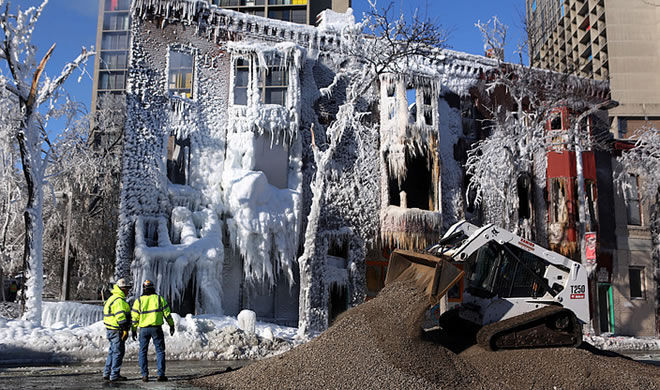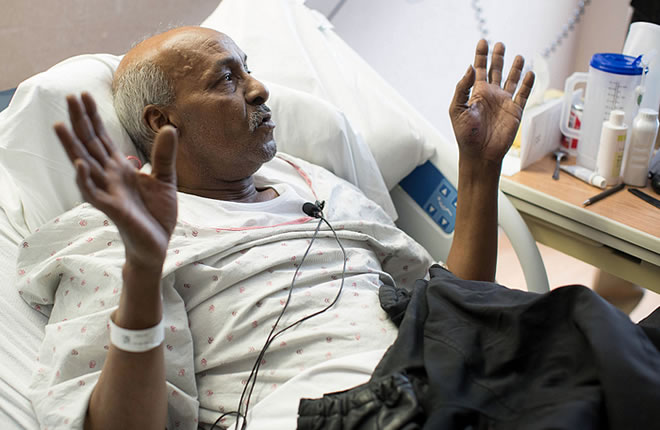
By Laura Yuen
Thursday, January 1, 2015

Crews work at the scene a day after an apartment fire in the Cedar-Riverside neighborhood of Minneapolis, Jan. 2, 2014. Jeffrey Thompson / MPR News file
The fall broke his back and both legs, but it saved him from a New Year's Day explosion in Minneapolis that killed three people, injured 14, and displaced a bustling neighborhood mosque.
"I did what I was supposed to do," Qobey, 60, said of that fateful morning. "Sometimes you celebrate good anniversaries, and sometimes you celebrate sad anniversaries. This one is sad for me because I was almost dead, and my friends are dead, too."
Today brings Qobey a flood of emotions -- gratitude for the doctors at Hennepin County Medical Center, and grief over the loss of the three men killed in the Cedar-Riverside apartment building.
Earlier: Cedar-Riverside fire survivors recount harrowing moments

Fire victim Abdi Qobey Jennifer Simonson / MPR News
The building was demolished months ago. Investigators haven't determined the cause of the explosion. They likely never will.
For one of the most severely injured survivors, New Year's is hardly a time for celebration and renewal. Muqtar Said said 85 percent of his body suffered from third-degree burns. He said he spent three months in a coma, three months in intensive care, and a final three months in home care. For about eight months, Said was on dialysis because of kidney failure.
"I have ongoing problems that I'll probably have for the rest of my life," said Said, a truck driver who says he has not been able to return to his work because of his injuries.
Said has hired a lawyer but declined to say what legal options he was considering.
Most of the victims have recovered, despite having lost everything, said Mohamud Noor, director of the Confederation of Somali Community in Minnesota. His organization has helped a handful of the survivors get back on track. Some received donations from the community to help pay for a few months' rent. Now many survivors are on the mend and back at work, Noor said.
But he predicts other individuals will have a much harder transition.
"They're doing well, but it will take longer for them to get normal," Noor said. "And some of them will never see normalcy because the disaster changed their lives completely."
The fire also displaced the Twin Cities' first Somali-operated mosque -- and all of the prayer services, classes, and social services it housed. A fixture in the neighborhood since 1998, Dar al-Hijrah served about 300 Muslim worshippers, many of whom lived steps away in the apartments in or around Riverside Plaza. The mosque's weekend Islamic school has found a temporary home at the nearby Brian Coyle Community Center.
Rebuilding the mosque started in October, later than expected -- in part because the insurance company was slow to respond, said mosque board leader Abdisalam Adam. But now that work has started, congregants are feeling more hopeful about 2015, he said.
"Last year, January 1 was really a sad time," Adam said. "But now, many people are looking forward to opening the mosque. The general mood is to be optimistic about the New Year."
He said mosque officials hope to open their doors in February or March. They're hosting a fund-raiser at 4:30 p.m. Thursday at the Brian Coyle center.
Assistant Chief Cherie Penn of the Minneapolis Fire Department said the investigation remains open. She said in about 20 percent of cases, investigators can't say definitively how a fire started.
"Sometimes a fire can tell such a clear story, and the burn patterns are apparent," she said. "But sometimes because of the intensity of the burn and the destructive way that they burned, they can't be determined."
Survivor Abdi Qobey said he wished fire investigators could pinpoint who or what was at fault in order to provide a sense of justice for the victims' families.
As for why he lived when others died, Qobey does not credit his own actions. On that brutally cold morning a year ago, when the flames were closing in on him, he said it simply wasn't time for his life to end.
"Whatever happens, it's been written before you were born," he said. "You have no choice."